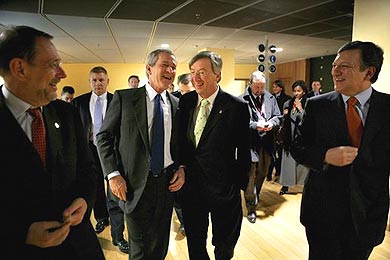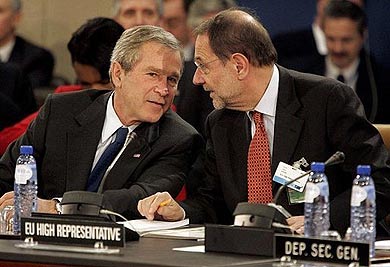
DECEMBER 2005
American Committee for a Strong Europe
The neocons new strategy for Europe
by Thierry Meyssan
The European scene has been modified by the rejection of the European Constitutional Treaty in France and the Netherlands and the result of the recent legislative elections in Germany. Thierry Meyssan reveals the analyses of US neoconservatives and their new strategy for Europe.

From left to right: Javier Solana, George W. Bush, Jean-Claude Juncker and Josť Manuel Barroso in February 2005.
As a result of the lessons learned from the events that have shaken Europe over the past two years, the neoconservatives have decided to change their own agenda for this region of the world, which originally involved:
1) Redeploying the US military forces stationed in Europe, moving them to the East and the South to control Central and Eastern Europe, and establishing a “containment belt” around the Russian Federation;
2) Neutralizing any efforts towards an independent European Defense and reinforcing NATO’s leadership;
3) Leaning on the Brussels Commission to attain a merger between the US free trade zone and that of Western Europe. In order to achieve that goal, they counted on a supposed “constitutional” treaty that would establish, in advance, the powers and the political program of the Commission so that the latter would be completely free from any opposing power.
The redeployment of US troops has been taking place without any questioning. The European Union affectively participates – not complaining – in all destabilization operations carried out around Russia; with the pretext of carrying out programs of assistance and economic development, the EU facilitates US interference in the Caucasus; Javier Solana himself was in Ukraine supervising the “Orange” Revolution; and the Commission is financing a destabilization program against Belarus.
The loyal Solana,
who has not forgotten that he was the NATO General
Secretary before he was appointed General Secretary of
the European Union, managed to have the Council of Heads
of State and Government adopt a strategic doctrine that
copies very faithfully that of President Bush. This is
why the EU’s defense is more than ever dependent on
NATO. However, although Solana was successful in
involving the European Union in Afghanistan and Sudan, he
failed in the case of Iraq.
Based on this incomplete result, the neoconservatives
concluded that it was possible to manipulate the European
Union within the European continent, but its members have
so differing interests around the world that they are
unable to perform the role the conservatives have given
them.
 George W. Bush and
Javier Solana.
George W. Bush and
Javier Solana.
Finally, they have
had to take into account the failure of the
Constitutional Treaty project, rejected by the French and
the Dutch, and also the failure of Angela Merkel, who was
expected to include the Germans in the pseudo-liberal
globalization. After interpreting these events as an
illustration of the fears of expansion of the European
Union and the immigration it is causing, or as a
depressive crisis in the face of unemployment, equally
translated into extremist votes, and even anti-Semitic
ones, the neoconservatives understood that they would not
be able to impose the Anglo-Saxon socio-economic model on
recalcitrant populations through the political way. They
have now changed their plans and have decided to look for
the support of the world faction of national business
owners. Josť Manuel Barroso, appointed president of the
Commission thanks to George W. Bush after he organized
the Summit of the Azores prior to the invasion of Iraq,
was ordered to put the European Constitution aside and to
readjust the mechanism. Thus, last week, Barroso
announced the burial of the 70 legislative projects
saying they are too complex and annoying for the public
opinion. The truth is that the strategy has been changed:
it is no longer about ruling under the authority of the
Commission, but about dismantling what currently exists
and transferring the making of the regulations to a
transatlantic Regulation Forum controlled by the top
chiefs of the Transatlantic Business Dialogue (TABD).
In accordance with this new trend, the directives of
Reach and Bolkenstein, which had been sacrificed so that
the Constitution could be approved, have now resurfaced.
The first one aims at eliminating regulations for
chemical production. The second, obviously more
important, aims at eliminating national social
legislations so that the European Union may be compatible
with the North American Free Trade Agreement (NAFTA). The
principle is simple: taking free circulation as a
pretext, the business owner has the possibility of
choosing which social legislation he will put into
practice for his employees and transferring the social
headquarters of his companies to the country where the
legislation best fits his interests.
In addition, so as to convince the European people of
what politicians have not been able to impose on them,
the neoconservatives are now turning to Pope Benedict XVI
and the Catholic Church. The leaders of the US Episcopal
Conference and the Episcopate Commission of the European
Union met in Brussels, from September 21st to the 23rd,
to express their support of the “New Transatlantic
Agenda”. In Washington, the neoconservatives decided
to adapt their organizational mechanism to the new
strategy. In the American Enterprise Institute, the group
in charge of writing the presidential program of George
W. Bush, the Project for a New American Century, was
discreetly disbanded last week. It was replaced with the
American Committee for a Strong Europe. “Strong
Europe” actually means a Europe that can do the work
that US troops currently do around the world and one that
can defeat any anti-globalization efforts ion its own
continent.
This Committee,
which will try not to interfere too openly with the
European Union policy, immediately asked the
“friends of America” to do it for them. Thus,
Saudi Arabia said “present” and will finance
the next electoral campaign of Nicolas Sarkozy in France
so that the neoconservatives can get rid of Dominique de
Villepin. Similar measures were taken with respect to
each and every big state of the European Union.
Thierry
Meyssan Journalist and writer, president of the
Voltaire Network.